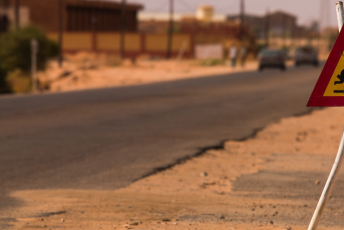Since the end of 2017, hundreds of undocumented migrants from Côte d’Ivoire, Cameroon, Senegal, Mali and Guinea have been repatriated from Algeria. This is not a new phenomenon. At the end of 2014, for instance, Algeria and Niger agreed for undocumented Nigeriens to be returned to their home country. So far, 28 000 Nigeriens have been repatriated.
While this took place as part of a voluntary programme with the support of the International Organization for Migration (IOM), other cases raise concerns. International and domestic human rights organisations have referred to some operations as instances of forced deportation, and have accused Algiers of violating the human rights of migrants and even asylum seekers.
Algeria’s neighbours have also spoken out strongly against these repatriation operations. In response to the deportation of other nationals through Niger, the country reiterated that its agreement applies to Nigerien nationals only, and urged Algerian authorities to abide by this.
The latest repatriation of Malian nationals in March (some 1 641 Malians have been deported since January 2018), led to a series of protests in front of the Algerian embassy in Bamako. Demonstrators raised concerns about alleged profiling, arbitrary arrests and the mistreatment of individuals who are suspected to be undocumented migrants. It also led to diplomatic tensions between the two countries, with Mali reportedly recalling its ambassador in Algiers and consul in Tamanrasset.
The post of the Guinean ambassador to Algeria has also remained vacant since January 2018, when President Alpha Condé recalled the ambassador in response to cases of alleged mistreatment. The impact of these diplomatic incidents will be felt across the region.
The issue of migration is complex, and must take into account factors like security, human rights and crime prevention. For a migration policy to be sustainable, just and effective, it must balance these factors and be led by various actors.
In Algeria, migration has been treated almost exclusively as a security issue dealt with by law-enforcement authorities. In an apparent bid to justify this approach, Algerian Prime Minister Ouyahia said in a televised interview last year: ‘These foreigners staying illegally bring crime, drugs and other plagues,’
Algerian law criminalises the illegal entry, residency and exit of the country. While special provisions are made for certain categories of foreigners, it excludes those who ‘violate the security of the State, public order, morality and organized crime legislation’. Revising this would be a step towards ensuring that migrants are treated more fairly, and boost the rule of law.
The absence of an asylum law is a conspicuous one in Algeria’s legal framework. In 2004, Algeria ratified the International Convention on the Protection of the Rights of All Migrant Workers and Members of their Families, but this still needs to be strengthened in domestic legislation.
The current legislative context frames migration as a security concern, which is also reflected in the way that repatriation operations are conducted. Amnesty International found that after migrants are arrested by the police in Algiers, Blida or Oran, they are transferred by bus to retention centres (such as the infamous Zeralda centre), then to Tamanrasset and finally to Guezzam or In Khalil at the Nigerien and Malian borders.
In recent correspondence with the United Nations Committee for the Protection of Migrant Workers, Algeria denied the existence of retention centres for migrants, but acknowledged the existence of ‘reception’ centres as part of the voluntary departure programme.
With the exception of the Algeria Red Crescent (which did not react to the allegation of mistreatment), no other humanitarian organisations took part in these operations. The involvement of other neutral international organisations would make the process more transparent, and help to ensure that the needs of migrants – especially the most vulnerable – are adequately catered for.
Although Algeria has been in the spotlight recently, the country’s neighbours are equally in need of a sustainable and rights-based migrant policy. Tunisia, for instance, also currently lacks an adequate legal framework on migration and asylum. Confronted with the instability in Libya, Tunisian authorities have been allowing undocumented migrants – a process that is currently managed by the IOM, UNHCR and the Tunisian and Libyan Red Crescent.
Recently, there appears to have been a decrease in the flow of migrants to Europe from Libya. This has been linked to renewed international pressure, and increased – albeit controversial – assistance to Libyan law enforcement agencies. While it’s too soon to measure the impact of these developments, stronger borders in Libya means that alternative routes are likely to become busier. This, in turn, could increase pressure on Algeria.
In 2013, Morocco introduced a new migration strategy, which authorities said was ‘more comprehensive, humanist and responsible’. In 2014 and 2016, some 50 000 migrants – mostly sub-Saharan Africans – were allowed to legalise their presence in the country. The issuing of residence permits is strictly controlled, so this was a significant development. The efficiency and sustainability of this new approach could still be strengthened with the adoption of a specific law on asylum and migration.
The current situation in North Africa shows that the international community should anticipate shifts in migration flows in the region, and support the enactment of adequate legal frameworks. At the same time, technical assistance programmes should work to establish a bottom-up approach whereby professionals in the field – especially law enforcement officials, customs agents, magistrates and social workers – are trained to adhere to international best practices for protecting undocumented migrants.
Algeria plays a major role in regulating migration flows between sub-Saharan Africa and Europe. The country is also increasingly becoming a destination for undocumented migrants – which raises legitimate concerns. But if Algeria wants to establish itself as a leader in the continent’s peace and security, it should start by resolving its policy conundrum with a rights-based approach to migration.
Jihane Ben Yahia, ENACT Regional organised crime observatory coordinator – North Africa, ISS







